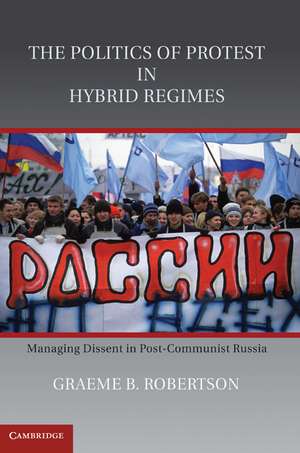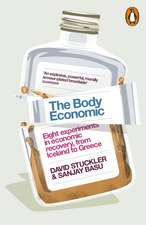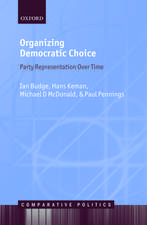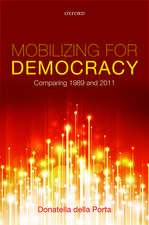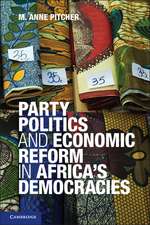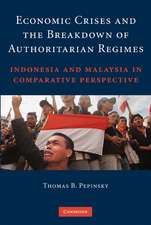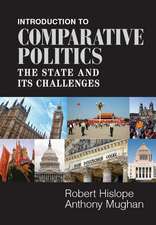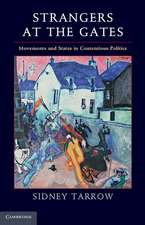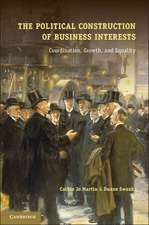The Politics of Protest in Hybrid Regimes: Managing Dissent in Post-Communist Russia
Autor Graeme B. Robertsonen Limba Engleză Hardback – 19 dec 2010
Preț: 790.81 lei
Preț vechi: 919.55 lei
-14% Nou
Puncte Express: 1186
Preț estimativ în valută:
151.32€ • 158.41$ • 125.21£
151.32€ • 158.41$ • 125.21£
Carte tipărită la comandă
Livrare economică 05-19 aprilie
Preluare comenzi: 021 569.72.76
Specificații
ISBN-13: 9780521118750
ISBN-10: 0521118751
Pagini: 304
Ilustrații: 20 b/w illus. 20 tables
Dimensiuni: 165 x 236 x 20 mm
Greutate: 0.56 kg
Editura: Cambridge University Press
Colecția Cambridge University Press
Locul publicării:New York, United States
ISBN-10: 0521118751
Pagini: 304
Ilustrații: 20 b/w illus. 20 tables
Dimensiuni: 165 x 236 x 20 mm
Greutate: 0.56 kg
Editura: Cambridge University Press
Colecția Cambridge University Press
Locul publicării:New York, United States
Cuprins
1. Introduction; 2. Protest and regimes: organizational ecology, mobilization strategies and elite competition; 3. Protest and regime in Russia; 4. The geography of strikes; 5. A time for trouble; 6. Elections and the decline of protest; 7. Vladimir Putin and defeat-proofing the system; 8. Protest, repression and order from below; 9. Implications for Russia and elsewhere.
Recenzii
“In this superb study of protest in post-Soviet Russia, Graeme Robertson presents detailed quantitative and qualitative evidence to develop a theory of how regime-type shapes the frequency and character of protest. In the process, he not only undermines widespread stereotypes about the passivity of Russians, but also provides a better understanding of how protest can be functional to the stabilization of a semi-authoritarian regime.”
—Mark Beissinger, Princeton University
“By demonstrating that protest in post-communist Russia has been far more prevalent than appreciated, Robertson provides a contrarian answer to one of the great puzzles of the postcommunist transformation: the supposed lack of protest despite wrenching social change. Well-written and closely argued, this work adds greatly to our knowledge of contentious politics and hybrid regimes by showing how elite politics and electoral completion shape the decision to take to the streets. The lessons from this important book apply well beyond the post-communist world.”
—Timothy Frye, Columbia University
“Robertson has produced a breakthrough in how we understand mass politics in 21st century hybrid regimes, countries like Russia that combine elements of democracy and autocracy. Exposing as a myth the notion that Russians are generally passive in the face of hardship, The Politics of Protest in Hybrid Regimes explains how and why they mobilize at some times but not others, and spells out implications for regime stability and the possibility of long-run democratization. The book is full of clever insights and combines the satisfying rigor of strong quantitative analysis with the enjoyable nuance of a story told well based on extensive on-the-ground fieldwork and deep country knowledge.”
—Henry Hale, The George Washington University
“In The Politics of Protest in Hybrid Regimes, Graeme Robertson has made a substantial contribution to our understanding of the interplay between ruling elites and popular protest in hybrid regimes. Employing a unique set of Russian Interior Ministry reports on strikes and protests in the late Yeltsin period as well as evidence from the Putin era, Robertson demonstrates that three sets of factors—the organizational environment for associations, the strategies used by political elites to mobilize the public, and the nature of intra-regime political competition—explain the variation in the level of popular protest across time and space. Robertson's argument has major implications for a broad range of contemporary regimes.”
—Thomas F. Remington, Emory University
—Mark Beissinger, Princeton University
“By demonstrating that protest in post-communist Russia has been far more prevalent than appreciated, Robertson provides a contrarian answer to one of the great puzzles of the postcommunist transformation: the supposed lack of protest despite wrenching social change. Well-written and closely argued, this work adds greatly to our knowledge of contentious politics and hybrid regimes by showing how elite politics and electoral completion shape the decision to take to the streets. The lessons from this important book apply well beyond the post-communist world.”
—Timothy Frye, Columbia University
“Robertson has produced a breakthrough in how we understand mass politics in 21st century hybrid regimes, countries like Russia that combine elements of democracy and autocracy. Exposing as a myth the notion that Russians are generally passive in the face of hardship, The Politics of Protest in Hybrid Regimes explains how and why they mobilize at some times but not others, and spells out implications for regime stability and the possibility of long-run democratization. The book is full of clever insights and combines the satisfying rigor of strong quantitative analysis with the enjoyable nuance of a story told well based on extensive on-the-ground fieldwork and deep country knowledge.”
—Henry Hale, The George Washington University
“In The Politics of Protest in Hybrid Regimes, Graeme Robertson has made a substantial contribution to our understanding of the interplay between ruling elites and popular protest in hybrid regimes. Employing a unique set of Russian Interior Ministry reports on strikes and protests in the late Yeltsin period as well as evidence from the Putin era, Robertson demonstrates that three sets of factors—the organizational environment for associations, the strategies used by political elites to mobilize the public, and the nature of intra-regime political competition—explain the variation in the level of popular protest across time and space. Robertson's argument has major implications for a broad range of contemporary regimes.”
—Thomas F. Remington, Emory University
Notă biografică
Descriere
This book shows how one high-profile hybrid regime manages political competition in the workplace and in the streets in Russia.
